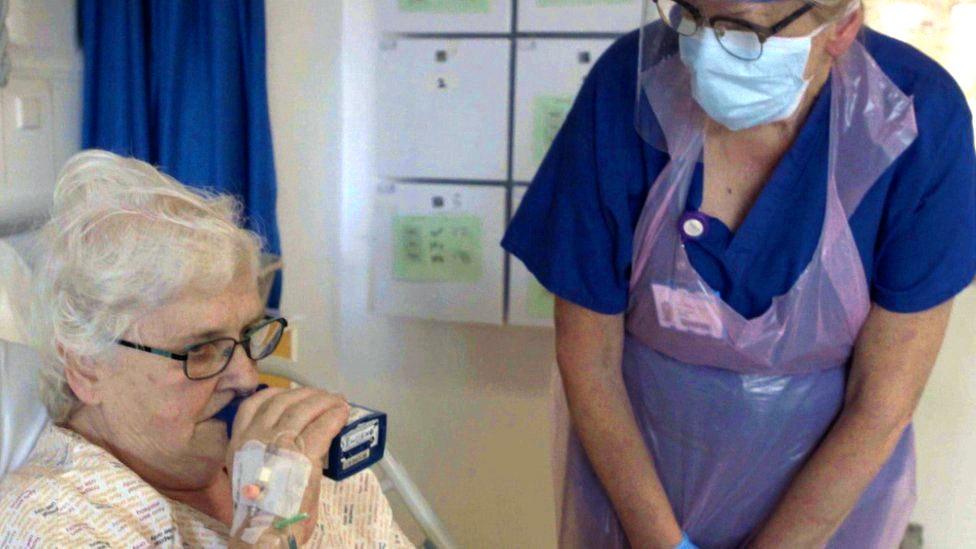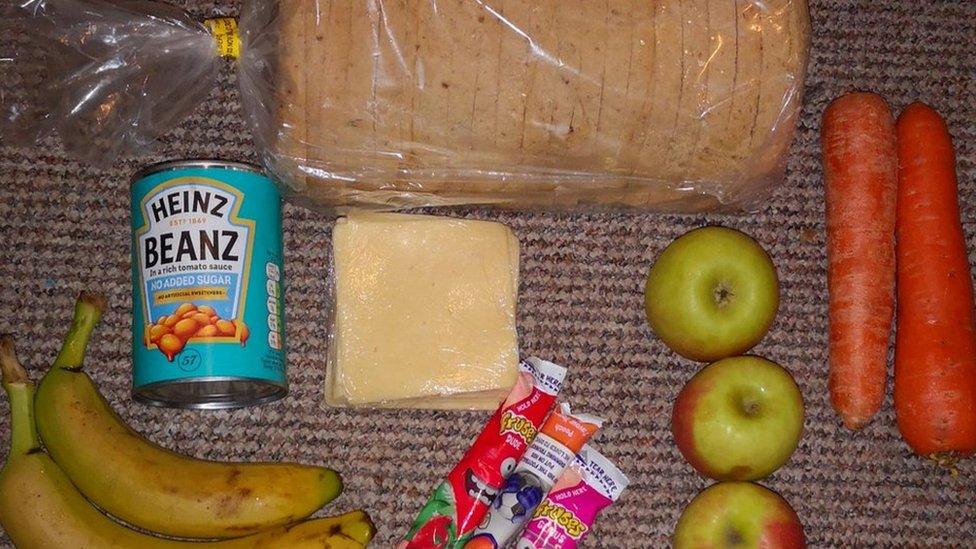Covid-19: We can make this the peak by following rules, says Hancock
- Published
- comments
Matt Hancock: 'Together we can make this the peak'
"We can make this the peak" of the coronavirus pandemic "if enough people follow the rules", Health Secretary Matt Hancock has said.
He told BBC Breakfast it was "those individual decisions" that determine the virus's spread and it "comes down to the behaviour of everyone".
People "shouldn't take the mickey out of the rules," he said.
Under the national lockdown, people in England must stay at home and only go out for limited reasons.
This includes for food shopping, exercise, or work if they cannot do so from home. Similar measures are in place across much of Scotland, Wales and Northern Ireland.
Latest figures show there are now more than 35,000 people in hospital with Covid - an increase on the spring peak.
It comes as Prime Minister Boris Johnson is set to be questioned by MPs on the vaccine rollout later.
Meanwhile, Scotland's First Minister Nicola Sturgeon is also due to announce whether there will be any changes to lockdown restrictions later. Ministers have been discussing the possibility of tightening the current restrictions.
When asked on BBC Breakfast if this was the peak of this wave of the pandemic, Mr Hancock replied: "I want it to be, but that comes down to the behaviour of everyone.
"Together we can make this the peak if enough people follow the rules which are incredibly clear."
Mr Hancock said England's lockdown measures were "always under review", but he would be "very reluctant" to remove the rule of meeting one other person outside for exercise as "it is a lifeline" for some people, including those who live alone. Mr Hancock has already ruled out scrapping support bubbles.
"What I'd rather is that everybody follow that rule and doesn't stretch it or flex it," he said.
On the news that patients at a hospital in London are to be discharged early and sent to a hotel to help free up beds for critically ill coronavirus patients, Mr Hancock said moving patients to hotels "isn't something we are actively putting in place".
King's College Hospital said it would help to create space for the "high numbers" of new admissions and would "temporarily accommodate mainly homeless patients who are ready to safely leave hospital and will benefit from further support from community partners".


There are very early signs that infections may have peaked - although as always we should be careful about reading too much into a few days' worth of data.
The past two days have seen newly diagnosed cases hover around the 46,000-mark. Up to the weekend, the average was close to 60,000.
The drop has largely been driven by falls in new cases in London, the South East and East of England.
The national picture does mask some regional differences. Cases are rising in the North West, which is causing particular concern.
It is too early for the vaccination programme to be having any significant impact so a combination of the national lockdown on top of the tier four restrictions that were imposed in some areas before Christmas look like they may be beginning to have an impact.
There is also some evidence the new variant may not be quite as fast-spreading as first feared - a Public Health England study suggested rather than being 70% more transmissible it may actually be somewhere between 30% to 50%.
And, if it does represent the start of a continuous fall, it is important to remember it will still take some time to translate into fewer hospital cases - people being admitted at the moment are those who would have caught the virus a week or two ago.
But after six weeks of pretty sustained rises, it is at least an encouraging sign.

Asked about images of elite footballers celebrating goals with hugs, Mr Hancock said: "I think elite sport is important because these are tough times, and being able to watch the football on the telly is really important because there's loads of things that you can't do."
He said the Premier League has "special arrangements to ensure that players are safe" as well as a testing regime.
Vaccine supply 'will increase'
The health secretary told BBC Radio 4's Today programme the rollout of the coronavirus vaccine will accelerate over the coming weeks, saying they were "on track" to deliver it to 14 million people by mid-February.
Vaccines deployment minister Nadhim Zahawi later told the Commons' science and technology committee that he was "confident" of achieving this target.
More than 2.4 million people have now had a first dose of a coronavirus vaccine, while 412,167 people have had a second dose. Mr Hancock said 40% of the 3.4m people over 80 in England had been vaccinated so far.

LOOK-UP TOOL: How many cases in your area?
YOUR QUESTIONS: We answer your queries
GLOBAL SPREAD: How many worldwide cases are there?
THE R NUMBER: What it means and why it matters

"We have the capacity to get that vaccine out. The challenge is that we need to get the vaccine in," Mr Hancock said.
"What I know is that the supply will increase over the next few weeks and that means the very rapid rate that we are going at at the moment will continue to accelerate over the next couple of weeks."
On Tuesday, NHS Providers chief executive Chris Hopson said it was "pretty clear" that because of the new strain the Covid-19 infection rate was not going to go down as quickly as it did during the first wave.
"It now looks like the peak for NHS demand may actually be in February," he said.


In other developments:
The Department of Health and Social Care is considering a pilot scheme to offer Covid vaccinations 24-hours a day at some locations, aimed at NHS shift workers, our chief political correspondent Adam Fleming says
Mayor of London Sadiq Khan has said he is "left with little choice" but to ask the government to tighten measures, external as London's coronavirus cases "are worse than in March, yet our restrictions are looser"
A large-scale trial of a new treatment it is hoped will help stop Covid-19 patients from developing severe illness has begun in the UK
Many hospital staff treating the sickest patients during the first wave of the pandemic were left traumatised by the experience, a study suggests
Customs operators have pleaded with the government to prioritise vaccinations for staff they insist are key front-line workers, while parents of children with disabilities are also calling for teachers in special schools to be vaccinated against Covid-19
Supermarket chain Asda says it will be the first to open an in-store Covid vaccination centre, having been chosen by NHS England to operate one. An in-store pharmacy in Birmingham will administer vaccines from 25 January
A coronavirus vaccine developed by China's Sinovac has been found to be 50.4% effective in Brazilian clinical trials, according to the latest results released by researchers.
Related topics
- Published13 January 2021

- Published13 January 2021
